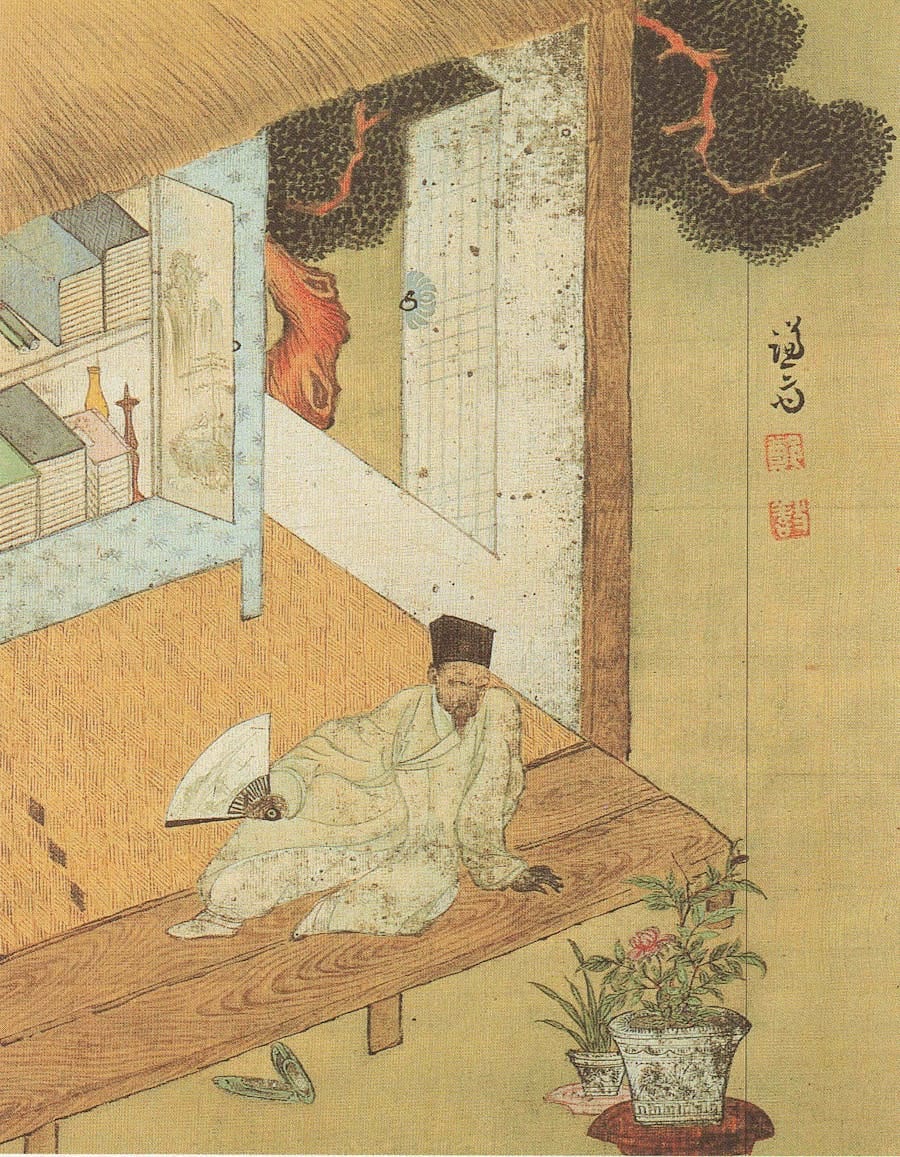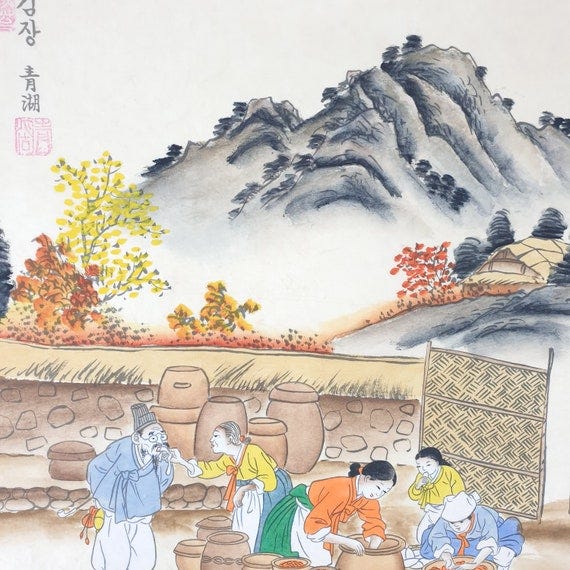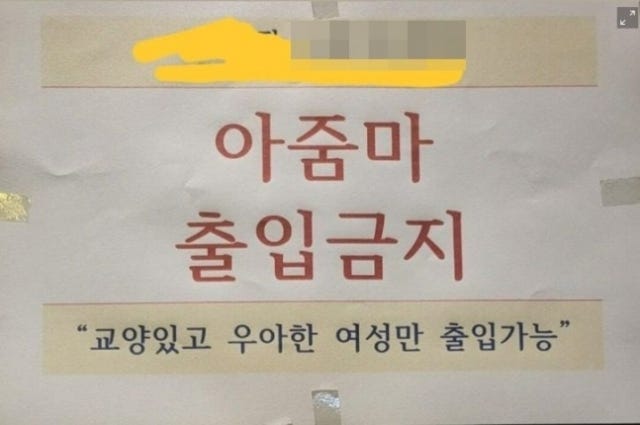K-Lit No. 6: The Substitute Teacher
"Someday, all the wrongs will be made right, like one pull on a string that would untangle the knot."
Read it here: The Substitute Teacher
About the author: Son Bo Mi
Translated by: Janet Hong
Summary:
This is a story about a woman named Ms. P and her relationship with one family over her tenure as their little boy’s nanny.
Thoughts on The Substitute Teacher:
Son Bo Mi begins the story with a pleasant scene: an idyllic day at the park; an adorable little boy “with a bowl haircut and monolid eyes,” and with him, hand-in-hand, an attentive guardian, Ms. P. But this sweet scene is gilded in a soft sense of foreboding. Maybe it’s the use of the conditional, or perhaps, it’s that Ms. P’s joy is too precious.
The first line of the second paragraph gives us a sense of how Son uses her narrator to give us just enough:
“At this point, it might be good to mention the boy’s mother. According to her, she had ‘been tricked into marriage’ by her husband, but that was just a playful complaint.”
The boy’s mother, who may or may not have been tricked into marriage by her husband, was immediately suspicious to me. Throughout the first paragraph, we wonder who exactly Ms. P is in relation to the boy, but we know her feelings for the child are maternal. When the boy’s mother is introduced, Son gives us a reason to believe she might be duplicitous. There tends to be suppressed truth to these kinds of “playful complaints,” and the more Son reveals about the boy’s mother, the more we worry it might be she who thwarts Ms. P’s happiness.
What I love about Son’s craft here is that she doesn’t narrate the boy’s mother’s feelings directly. So we pay attention. We pay attention to the details of this woman’s ambitions, what she says to her friends about her marriage, her pregnancy, her “priceless” little boy.
“But was it hard raising him? No, no, it was pure joy.”
And, of course, we pay attention when the mother is asked to share her thoughts on the nanny, Ms. P.: “Oh, her? Hmm…she’s a good person.”
Ms. P used to be a substitute teacher, she was good at it, “she loved her job”. But how she is seen by the boy’s parents changes over time–there is no personal relationship between Ms. P and the parents, despite the intimacy she feels caring for the child, and when her utility has run its course, she is discarded.
It’s a subtle rebuke of South Korean society, I think. Ageism cost Ms. P her teaching job, despite her skill; what a contradiction in a society where reverence for the elderly is embedded in the language. It’s a big economic problem for Korea.
Allow me to take a HUGE detour here to share a bit of the introduction of this paper by Jooyeon Kang, Jungmin Park, and Jaemin Cho:
Korea has achieved impressive economic development, referred to as the “Miracle of the Han River”, over the past half-century. Korea overcame absolute poverty by generating strong income growth, but the fruits of this economic growth were not equally distributed. Korea’s old age relative poverty rate is the highest among Organization for Economic Co-operation and Development (OECD) countries. Many experts have suggested that the overwhelming elderly poverty rate proves that income has not been redistributed well between generations and classes [1,2,3,4]. In addition, Korea is expected to enter a super-aged society having more than 20% of aged people among the total population by 2025 [5], which increases the risk of elderly poverty. The theme of this study, the problem of poverty among the elderly, arises at the interface of two key issues in Korean society: polarization and aging.
The current poverty and income inequality among the elderly are attributed to the fact that inequality in the labor market is reflected in the social security system at a time when private support for the elderly is weak. A socioecological system perspective that focuses on the interaction between an individual and the environments surrounding that individual indicates diverse poverty factors. First, on an individual level, there is not enough preparation for retirement. Although awareness of preparation for retirement has increased, senior citizens fail to prepare for their retirement due to higher spending. This spending often comprises debt repayment and education expenses for children that are more than these citizens can afford. Second, an increase in women’s social participation and nuclear families at the interpersonal level weakens the family’s private support of aged parents. Third, the legal retirement age in Korea is 65, but the average retirement age is much lower due to corporate labor cost avoidance. Fourth, at a community level, Korea’s labor market is divided between a primary labor market composed of large companies and regular workers and a secondary labor market consisting of small- and medium-sized companies and irregular workers. This division results in high income inequality. Workers in the secondary sector often find preparing for retirement difficult by means other than public pensions, which are not sufficient enough. Moreover, retirement pension, one of the representative public pensions, is often not subscribed to, since only workplaces with more than 300 employees have been obligated to introduce retirement pensions since 2019, so most small- and medium-sized workplaces have offered it voluntarily. Finally, in terms of the legal system, Korea’s public pension has a low-level income replacement rate that refers to the pension as a proportion of income received by the worker, and a wide gap that does not include the elderly who worked in the secondary job market or who were unemployed.
Poverty among the elderly is always mentioned as one of the most urgent social problems when discussing the issues facing Korean society. The seriousness of elderly poverty is also evident in the fact that Korea maintains one of the world’s top 10 GDP levels while showing the highest elderly poverty rate among OECD countries. On average, OECD countries do not have much difference in poverty risk by age, but in Korea, poverty risk increases rapidly in old age. The poverty rate of senior citizens in Korea, which saw a median income of 50% in 2016, stood at 43.8%, more than three times that of the OECD national average of 13.5%.
(emphasis mine)

Alright, if you’re still me, let’s get back to the The Substitute Teacher.
**
Throughout this story, I got a sense that as a reader, I was being asked by the narrator to bear witness to Ms. P’s life. Nothing particularly wild happens. Nothing particularly unexpected. Yet, how Ms. P responds to the circumstances of her life, the actions of the little boy and his parents, is utterly heart-wrenching in its humanity. We know, in the end, Ms. P will be alone, and we know it didn’t have to be that way, and we know this because we’ve all moved on from someone, we’ve all discarded another human being at some point because they just didn’t fit anymore, because we didn’t have enough space, because they’d served their purpose and we needed to press forward. We knew all along Ms. P wouldn’t end up happy, because we all know what it’s like to be the boy’s mom. In that sense, like good literature does, this story quietly rebukes the reader, too.
But we all know what it’s like to be Ms. P, too, unseen for who we are. The story ends with Ms. P thinking through the choices she’s made in her life–the choices she made to care for her own family which led her to an unglamorous, non-prestigious, yet quietly noble life. I feel this deeply. I have an unglamorous, non-prestigious job that I chose to take so I could be present for my family and have space for my writing. Sometimes, at work*, I am deliberately made to feel invisible, small, or valued only for my utility. But just like Ms. P, what you see in my signature block is not the whole story about who I am and what I’m capable of.
I marvel at the ending of this piece because I’m not sure if it’s hopeful or tragic. Maybe it’s both. Maybe all we can do is hope, and even if we’re kidding ourselves a bit, if it lets us fall asleep at night, who’s to judge?
That’s life, she thought. It’s going to be all right. Someday, all the wrongs will be made right, like one pull on a string that would untangle the knot. Ms. P thought of these things as she closed her eyes. Falling asleep was always easier than she expected.

One more thing: Janet Hong’s translation is wonderful. Actually, she’s one of my favorite names to see as the translator of a piece (along with Anton Hur). She translated Son Bo Mi’s Literary Hub piece, The Cat Thief While The Substitute Teacher is a much more subdued piece, there’s a similarity between the voices of the two stories, so I feel like I’m getting a sense of Son Bo Mi’s actual voice. It’s a bit like playing telephone, I guess, but Janet Hong seems to be a solid receiver.
*for the record, everyone I work with directly is lovely. They’re my favorite people. But there are some outside of my department who care a lot more about my title (or lack thereof) and they aren’t nice. It is what it is.
Quoteworthy:
“As these memories floated through her mind, she glanced around the room—the lilies in the case on the coffee table, the geometric patterns on the curtains covering the balcony window, and the glass cabinet in the kitchen filled with decorative tea sets.”
“From the apartment, she saw the bridge that crossed the Han River, the rows of apartment complexes beyond that, and a giant Ferris wheel spinning the distance. Sunlight sparkled on the river’s surface, and the spring breeze made the water ripple, like hundreds of pages were turning. Suddenly, Ms. P’s heart sank, and she was filled with fear.”
K-Pop Recommendation:
My obsession with Song Sohee continues:
아 굿이로구나 아 굿이로구나 아 굿이로구나 아 굿이로구나 Info de de demics 이렇대 저렇대 시끄러 이것 봐 저건 뭐 말이 돼? 그러다 하는 말, 아님 말구 어디에나 말라버린 저 흑색의 도시 아무렇지 않게 외면하다 모두의 눈은 멀었지 맘과 맘 사이 무엇이 남았는가 그리고 그건 어디에 있는가 눈이 먼 채로 놓아버린 화살은 정신없이 멀어지고 Info de de demics 이렇대 저렇대 시끄러 이것 봐 저건 뭐 말이 돼? 그러다 하는 말, 아님 말구 아 어지러워 울렁울렁이게 들리어 오다 악의는 없대도 서롤 할퀴여 악수를 두었지 보고 쓰고 말하고 듣는 모든 것 사이 자유로이 유영 중인 말들 깨부수고 나아갈 수는 없는가 평온한 저 세상으로 Info de de demics 이렇대 저렇대 시끄러 이것 봐 저건 뭐 말이 돼? 그러다 하는 말, 아님 말구 Info de de demics 이렇대 저렇대 시끄러 이것 봐 저건 뭐 말이 돼? 그러다 하는 말, 아님 말구 Info de de demics 이렇대 저렇대 시끄러 이것 봐 저건 뭐 말이 돼? 그러다 하는 말, 아님 말구
Oh, that's good. Oh, that's good. Oh, that's good. Oh, that's good. Info de demics They say this and that, it’s noisy Look at this, what does that mean? Then, no, no everywhere That black, dried up city turn a blind eye Everyone's eyes were blind What's left between my heart and my heart and where is it The arrow I let go blindly I'm moving away like crazy Info de demics They say this and that, it’s noisy Look at this, what does that mean? Then, no, no Oh, I'm dizzy It sounds loud and loud Even if there is no malice We scratched each other and shook hands. Everything you see, write, say, and hear Horses swimming freely Can't we just break it down and move on? To that peaceful world Info de demics They say this and that, it’s noisy Look at this, what does that mean? Then, no, no Info de demics They say this and that, it’s noisy Look at this, what does that mean? Then, no, no Info de demics They say this and that, it’s noisy Look at this, what does that mean? Then, no, no
I, for one, can’t listen to her without tears. The traditional ornamentations wreck me. Just gorgeous.
I mean, I don’t know who Chase and Melia are, but they were in awe of Song Sohee’s cover of BTS’ song Spring Day, and I mean—we all are. (I also enjoyed their discussion of her vocal techniques as cultural outsiders, but appreciators of the amazingness that is Song Sohee. There’s a lot they don’t know, but their speculation is humble & hospitable.)
(Here’s the original:)
One Last Thing:
Earlier this year, a gym in South Korea posted this sign on their door, essentially notifying patrons that there would be no ajummas allowed :
The gym specified ajummas from other women with a sign that posted a list of their supposed characteristics:
If one likes free things, regardless of one's age
If one gets sworn at everywhere but does not know the reason why
If one sits in a seat reserved for pregnant women on public transport
If one goes to a cafe with two people and orders just one cup of coffee and asks for a cup to share
If one secretly throws food waste into a public bathroom or other toilets
If one is frugal with their own money but not with that of others
If one has poor memory and judgment and says the same things over and over again.
There was public backlash, as you might expect, but apparently, the gym is within its rights to discriminate. Interesting stuff. Here’s the link to the full article, if you’re interested.








Really enjoyed reading this! I loved your analysis of the short story and how you shared the wider cultural context as well. Thank you for making these stories more accessible in English!!
That sounds like an interesting book. Re: the company retirement age, I remember one of the saddest days I had at 'S' company was seeing my director, Mr. P get retired out at 55. Mr. P was one of my interviewers and had helped me start with the company. I really liked working with Mr. P and missed having his as a manager. Not coincidently, things went downhill on the team from there and I ended u leaving 'S' company 6 months later and returning to Canada after 10 years in South Korea.
Fortunately, I was able to meet up with Mr. P several months later and he genuinely seemed much happier. In a way we was one of the luckier people though as he would have had a decent severance from 'S' company. He just needed to get by for the next decade until her turned 65 I suppose.
That sign with "아줌마 출입금지" is pretty bold and actually shocking to read to blatant like that. Thanks for sharing.